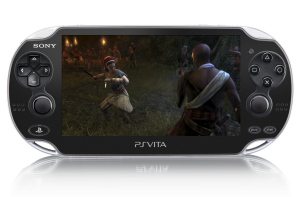 Adapting a big console franchise to the handheld is always a tall task for a developer to make and a big ask for the gamer to enjoy as well. It’s bad enough being compared to a major game put out a year ago, but Ubisoft took it to another level by releasing its PlayStation Vita title, Assassin’s Creed III: Liberation, at the same time as its big screen counterpart. While Liberation certainly benefits from cross promotion in marketing, I can’t see it escaping the shadow of the main Assassin’s Creed III title, and the head-to-head comparison isn’t terribly favorable either. However, when removed from this context, the Vita adaptation still holds its own in many ways as a decent handheld title and something worth playing for fans of the franchise at least, despite its many blemishes.
Adapting a big console franchise to the handheld is always a tall task for a developer to make and a big ask for the gamer to enjoy as well. It’s bad enough being compared to a major game put out a year ago, but Ubisoft took it to another level by releasing its PlayStation Vita title, Assassin’s Creed III: Liberation, at the same time as its big screen counterpart. While Liberation certainly benefits from cross promotion in marketing, I can’t see it escaping the shadow of the main Assassin’s Creed III title, and the head-to-head comparison isn’t terribly favorable either. However, when removed from this context, the Vita adaptation still holds its own in many ways as a decent handheld title and something worth playing for fans of the franchise at least, despite its many blemishes.
The first thing to note about Liberation is that it is not a direct port of Assassin’s Creed III, nor is it really all that tied into the main storyline. Desmond does not play a role and there is no real present day component to the story, either. Instead it is presented to you as a piece of entertainment created by Abstergo to white wash their role in history. This provides an interesting twist to the storytelling in that your first go through a particular scene tells you what the Templars want you to think. You can tell this is happening because the screen starts to glitch as the game is hacked by someone referring to himself as Citizen E. When you assassinate his avatar in the game, that unlocks the truth, replaying the cutscene with what the characters involved really said. Anyhow in the game you play as Aveline de Granpre, who like Connor is of mixed origin, in this case French and African. Most of the action takes place in the city of New Orleans and the surrounding bayou, during the same period as the American Revolution but at the same time rather distant from it as the global politics between Spain and France dominate things in this region. Aveline is your average lady by day, but an assassin by night as she works to protect her father’s merchant business as well as free slaves. Through the course of her work she uncovers a Templar plot revolving around mysterious artifacts from Mexico, hunting down the so-called “Company Man” behind everything. In my opinion the story wasn’t quite as tight and well written as the other installments of the series. It kind of jumps all over the place much like Aveline gets whisked off to different locales with things only loosely tied together. Her conflict with her mentor parallels Connor’s in some ways but is far more confusing. I will say though without spoiling that the last parts of the game and the ending almost makes everything worth it, and yes, she does cross paths with Connor for a bit.
Liberation plays and controls much like every game in Assassin’s Creed before it as far as the basics go. Thanks to the Vita’s ample supply of buttons and analog sticks, it practically handles itself exactly the same as the console versions. Aveline has some different tricks up her sleeve, however. Unlike Connor she can change her outfits at will, not just when the story calls her to. By stepping into dressing rooms which you can unlock throughout the city, she can become either be the Assassin, Slave, or Lady persona. Her abilities differ depending on which persona you choose. The Assassin persona of course is obvious, with full combat abilities but with the tradeoff of always being detectable at a base level (unlike Connor she cannot completely eliminate her infamy). The Slave persona on the other hand can still climb walls and use some of the weapons of the Assassin, but trades the ability to blend into her environment for less health. Meanwhile the Lady is least effective at combat, runs slowly, but is able to infiltrate more high security areas by charming guards, using her hidden blade, or poisoning them with her secret umbrella gun. They each have their role in the story, but when I had the option I found myself reverting to Assassin mode quite frequently as it’s the fastest way to get around. While realistic, it’s fairly annoying to plod slowly across the city in a fancy dress and thus the choice in gameplay is rather wasted in the end. The same could be said for the gratuitous use of Vita specific features like using the touch screen to open letters, or the mimicking of Uncharted’s use of the camera, requiring you to hold up your Vita to a bright light which is simply infuriating when you don’t have a satisfactory light source nearby. It’s cute the first time but we really don’t need things like that in Vita games any more, please. There’s also a new chain kill mode that uses the touch screen to cue up a series of moves, but I couldn’t always get it to work and it really felt kind of cheap anyway. As far as side games go, the cupboard is quite bare compared to the console offering. There is a mode where you can control Aveline’s shipping business by sending ships to import and export various goods for a profit, factoring the costs of storms and pirates, but the interface was completely unintuitive and the tutorial did not help whatsoever. The same goes for the multiplayer mode, which unlike the real games is hardly multiplayer at all but a turn-based affair that’s really no better than a web game. If you own the PlayStation 3 version, you can also connect it to your Vita for some exclusive goodies on both systems, so that’s nice I suppose.
Of course where a handheld version usually falters is in the graphical department. I’m happy to report that the Vita show itself to have enough horsepower to deliver an experience that’s quite acceptable in comparison to what you’d see on your HDTV. The game runs on the same engine as the real thing in fact, just pared down to the hardware’s capabilities. I would say it’s on par with Uncharted’s Vita conversion. Cutscenes are very detailed, draw distance is decent and the game doesn’t suffer much obvious pop in. The only complaint is that framerate can drop in crowded areas but it still remains quite playable. The artwork suffers a bit from the muted color scheme and the system’s limitations but Aveline in particular always shines, managing to look both fair to the eyes as a lady and fearless as an assassin.
Sound is a mixed bag however. The voice acting is mostly fantastic as usual and I have no real complaints there, though you may want to turn on the subtitles to make sure you catch everything they’re saying with all the French accents running around. I found the music to be a huge disappointment however. Nothing really stood out for me except the incredibly grating default music in New Orleans, which was too dramatic and thus recognizably repetitive. I ended up turning the music off whenever I returned to the city in order to escape that curse. I also didn’t appreciate the grunting of Aveline as she free runs. This is an area I would target for improvement in any potential sequel.
Assassin’s Creed III: Liberation is definitely the lesser version of the game, no doubt. The gameplay is not as deep and exhibits some flaws. I found the story to be a bit meandering and without focus for most of the game, and while it looks pretty it also can drive you nuts with its soundtrack and a myriad array of bugs. The game locked up and crashed on me at one point, and as I write this review, Ubisoft still has not patched a bug that can corrupt your save game, so until that comes out I suggest backing up to your PC through the Content Manager every chance you get. Still, despite these issues I enjoyed my time with Aveline and the expanded universe. AC diehards will particularly enjoy the last bits of the game as it ties into things. If you’re looking for a full fledged console-like experience on your Vita you could do a lot worse.
Gameplay
Graphics
Sound
Overall
Screenshots:

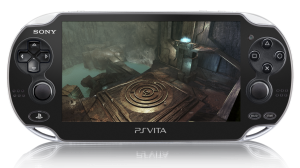
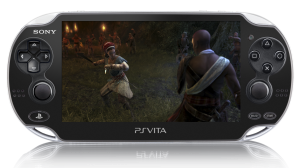
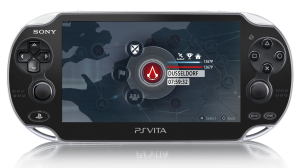
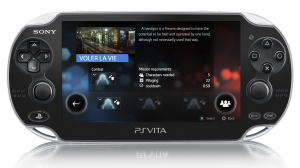


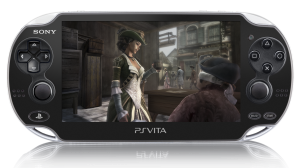


About time the Vita got some awesome games! I hope Ubisoft releases more hit titles on the Vita like this one.